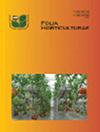Effect of exogenous essential oil treatments on the storage behaviour of apricot fruit harvested at different altitudes
IF 1.8
4区 农林科学
Q2 HORTICULTURE
引用次数: 0
Abstract
Due to the short shelf life of fresh apricots, special postharvest preservation techniques and practices are necessary to avoid significant economic losses. The purpose of the current study is to bring to light an approach that can be used to extend the storage life of apricot fruits treated with essential oils (EOs) (peppermint, thyme and carob EO) and examine the effects of two altitudes (1000 m and 1200 m) on the organic acid levels and respiration rate of apricot fruit during long-term storage. The results show that growing apricots at high altitudes increases the level of organic acids in the fruit, improving its quality and extending its postharvest life. Additionally, treating apricots with EOs postharvest slows down the respiration rate, reducing the consumption of organic acids during storage compared to the untreated fruit. The organic acid content was significantly higher in ‘Kabaaşi’ than in ‘Hacihaliloğlu’, and fruit harvested at 1200 m had significantly higher levels of organic acid than the fruit harvested at 1000 m. During storage, the highest organic acid content and the lowest respiration rate were observed in the fruit of both cultivars treated with peppermint, carob, and thyme oil, as compared to control fruit, respectively. To summarize, the use of EOs as postharvest treatment for apricot is recommended for maintaining the quality of the fruit during extended storage.外源精油处理对不同海拔地区收获的杏果贮藏行为的影响
由于新鲜杏的货架期很短,因此有必要采用特殊的采后保鲜技术和方法来避免重大经济损失。本研究旨在揭示一种可用于延长杏果经精油(薄荷、百里香和角豆树精油)处理后的贮藏期的方法,并研究两种海拔高度(1000 米和 1200 米)对杏果长期贮藏期间的有机酸水平和呼吸速率的影响。结果表明,在高海拔地区种植杏可以提高果实中的有机酸含量,改善其品质并延长其采后寿命。此外,与未经处理的果实相比,采后用环氧乙烷处理杏子可减缓呼吸速率,减少贮藏期间有机酸的消耗。在贮藏期间,与对照果实相比,经薄荷油、角豆树油和百里香油处理的两个品种的果实有机酸含量最高,呼吸速率最低。总之,建议使用环氧乙烷作为杏的采后处理剂,以保持果实在长期贮藏期间的品质。
本文章由计算机程序翻译,如有差异,请以英文原文为准。
求助全文
约1分钟内获得全文
求助全文
来源期刊

Folia Horticulturae
Agricultural and Biological Sciences-Horticulture
CiteScore
3.40
自引率
0.00%
发文量
13
审稿时长
16 weeks
期刊介绍:
Folia Horticulturae is an international, scientific journal published in English. It covers a broad research spectrum of aspects related to horticultural science that are of interest to a wide scientific community and have an impact on progress in both basic and applied research carried out with the use of horticultural crops and their products. The journal’s aim is to disseminate recent findings and serve as a forum for presenting views as well as for discussing important problems and prospects of modern horticulture, particularly in relation to sustainable production of high yield and quality of horticultural products, including their impact on human health.
 求助内容:
求助内容: 应助结果提醒方式:
应助结果提醒方式:


